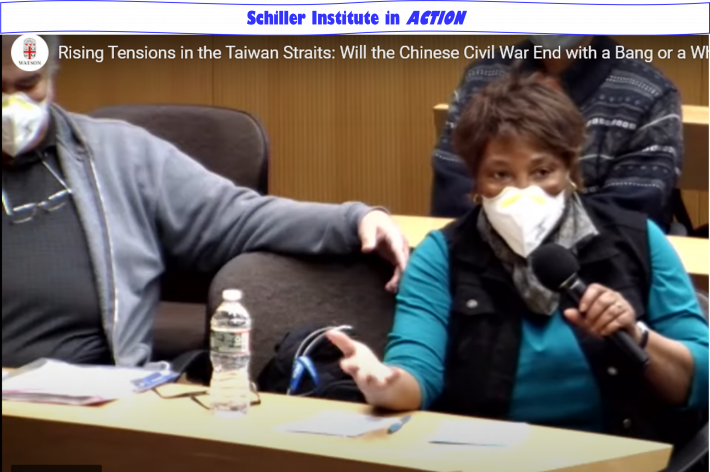Nov. 21 (EIRNS)–This is the edited transcript of the speech delivered by Mrs. LaRouche, the founder of the international Schiller Institutes, on November 17 to the online conference, “Humanitarian Roundtable for Afghanistan,” sponsored by the Council on Global Relations (CGR) located in Metro Washington D.C. The conference was convened by the CGR to address “the need for urgent assistance and a shift in narrative,” and to “make a difference in the lives of 39 million Afghan people facing a collapsed economy in the heart of a brutal winter coming out of 40 years of war.”
Hello to all of you.
I just want to state emphatically that the money that is being withheld by the U.S. Treasury—but also Commerzbank, Bundesbank, and the Bank for International Settlements—this money belongs to the Afghan people. I think that this is what we have to face, given the situation that was pointed out by both Dr. Beasley [of the UN World Food Program] and Dr. Tedros from the World Health Organization, that 97% of the people are in danger of being food insecure. And food insecure is just another word for starving to death.
Then you have a health crisis—95% of the people have no access to healthcare. And that is happening in a condition of famine and of the COVID crisis. So, to withhold that money for any more days means you’re risking the lives of people. So, I think the first step must be an absolute demand that the money which rightfully belongs to the Afghan people must be released without condition. I think this idea of giving it piecemeal and making conditions and so forth, that just will contribute to chaos. It will force the Taliban to resort to opium production, which they do not want to do. I think I mentioned in a previous discussion that Pino Arlacchi, the UN special representative in the fight against drugs in 2000, had an agreement with the Taliban, in which they agreed to stop all opium production.
The increase of the opium production occurred during the NATO presence—especially this year, opium production went up by nine percent in the period before the Taliban took over. Then the price shot up to the sky, because there was an expectation that Taliban would not continue the opium production. The price went up because of potential scarcity. So, the people who are withholding the money from the Taliban are pushing the opium trade! That should be stated very, very clearly.
Secondly, if you’re now not supporting a government that you may not like politically—but it’s there—and if you don’t support them being successful, you are encouraging the opposition. And what is the opposition? It has been largely terrorist groups, and you know that terrorism will spread, not only in Afghanistan but throughout the region. The big question is that maybe that is the intention, as a geopolitical force against the countries in the region, especially Russia and China.
So, the people who are withholding the money—and I want to be very, very clear, because there is no point in talking about nice things if that is not settled first—the people who are withholding the money are doing it completely illegally. And I think they should be held accountable. Any death which occurs from here on will be the guilt of the people withholding the money. And I think that has to be stated first.
I think if we can agree on that, then I’m willing to talk about a better vision. Psychologically, I can understand that it is very difficult for the NATO countries and their armies, after having lost a war having been in the country for 20 years. I talked to some people who were there, and I understand that this is a trauma. They did not expect it, and they are having a very hard time switching to another mental attitude. But that has to occur if Afghanistan is to be saved.
I have thought a lot about what can be done to give hope to a country that has gone through hell for the last 40 years. And really through hell for the last several 100 years—going back to the Great Game, to Brzezinski and his Islamic card that started this whole present disaster. People in Afghanistan have lived through trauma, and they need something to put the country back together with a beautiful vision. This region of the world was once known as the land of the 1,000 cities. Admittedly, this was on the order of 3,000 years ago, but there was once a period in which this region was one of the cradles of mankind. I think to be grounded in one’s own great tradition is a very important stepping-stone for building a positive future.
Then, naturally, there are many poets one could mention. The fact is that there is a health crisis right now of biblical dimensions, a pandemic which is unprecedented in terms of the potential of where it may go. So, my idea is: It has to start with the modern health system. Afghanistan needs modern hospitals. They can be built in two weeks. The Chinese proved in Wuhan that you can build a modern hospital of 1,000 beds in two weeks. Then you need doctors, modern, educated doctors, nurses, health workers. A lot of the diaspora Afghanis are doctors. They are in the United States, they are in Europe. They can be mobilized to come back and help to build a modern health system. And that modern health system can be the beginning of an economic transformation. If you are going to have a modern health system, you need water, you need electricity, you need other infrastructure. But that building of a modern health system can become the engine of hope and the engine of economic reconstruction. This, however, needs to have a beautiful vision, an idea of what that means.
Many years ago, I studied the works of Avicenna, or Ibn Sina as he is called in the Arab world. He was one of the great universal thinkers. He lived from 980 A.D. to 1038 A.D. He was not only an extraordinary thinker; he developed philosophical conceptions which had influence way beyond the Arab world, and to the Mediterranean, and to European thinkers. But especially it is known that he was an extraordinary physician. He wrote several medical books, and a canon on medicine which was the standard work in Europe until the 17th Century, and in some cases even the 19th Century. He developed an idea of the anatomy of the body, the nerve system, the psychology. He knew about new diseases like breast cancer. He developed the connection between muscles and nerves. He wrote a whole book about modern medicines based on herbs and other such things. But he is famously known to have been one of the great sons of Afghanistan.
He was probably born in Bactria. There are also some people who say, no, he was born in Bukhara, or maybe in Persia. It does not matter. His father was for sure born in Bactria, and he is for sure a son of the region.
He is an example of how somebody coming from Afghanistan can be a contributor to universal history, by moving mankind forward, by developing a whole new, modern medical science. So, I’m suggesting that the effort to save Afghanistan be called Operation Ibn Sina, because it somehow captures both the proud tradition and also a vision that Afghanistan again can be a pearl of the nations of the world. Afghanistan will be contributing something to other nations. You need to give people who have gone through such hell a vision of a beautiful future.
I think that would capture the imagination of a lot of the people, both inside Afghanistan and out. The danger is terrorism and drugs, and you want to have an image which presents a completely different future, one based on the intellectual tradition which made this country a great country in the past, and it means that it will again be a great country in the future.



















